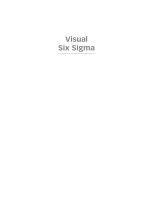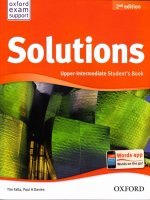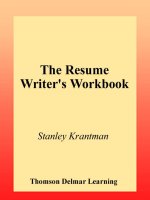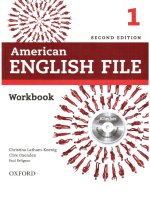Practical audio visual chinese students workbook 2nd edition 2
Bạn đang xem bản rút gọn của tài liệu. Xem và tải ngay bản đầy đủ của tài liệu tại đây (3.92 MB, 157 trang )
实用
视听华语
主编者:国立台湾师范大学
2
编辑委员:王淑美·卢翠英·陈夜宁
策划者:教育部
1
实用
视听华语
主编者:国立台湾师范大学
2
编辑委员:王淑美·卢翠英·陈夜宁
策划者:教育部
3
《实用视听华语》第 3 册共十四课,内容著重在校园活动和日常生
活话题。生字共 600 个,生词 1195 条,语法句型 137 则。每课加
附不同形式之手写短文。
《实用视听华语》第 4 册共十四课,延续介绍中华文化,包括社
会、历史、地理、人情世故。生字共 625 个,生词 1250 条,语法
配合情境介绍句型 119 则。每课加附手写短文。
《实用视听华语》第 5 册共二十课,课文介绍中华文化之特质及
风俗习惯;以短剧、叙述文及议论文等体裁为主,内容则以民俗文
化、傅统戏剧、文字、医药、科技、环保、消费、休闲等配合时代
潮流,以提高学生对目前各类话题讨论的能力。本册生词 667 条,
连结结构之句型 91 则。每课除课文外,另附有阅读与探讨、佳文欣
赏及成语故事。
本书所有的生字与生词及第 1、2 册课文,拼音系采用 1.国语注
音;2.通用拼音;3.汉语拼音并列,以收广为使用之效。
每册教材所包括的内容大致如下:1.课文、对话;2.生字、生词及
用法;3.语法要点及句型练习;4.课室活动;5.短文;6.注释。
本书第 1、2 册由王淑美、卢翠英两位老师负责改编工作;第 3、
4 册由范慧贞、刘咪咪两位老师负责改编工作;第 5 册由张仲敏、
陈莹涟两位老师负责改编工作;英文由任友梅小姐工作群翻译。并
由林姿君小姐、陈雅雪老师、林容年老师及三位助理完成打字及整
理全稿工作。插图则由张欣怡小姐补充设定完成。
本书在完成修改稿后,曾邀请华语文专家学者进行审查,经过修
订后定稿。审查委员如下:陈纯音教授、曾金金教授、陈俊光教
授、陈浩然教授。
本书改版作业历时半年有余,在台湾师大国语中心教材组陈立芬
老师等工作人员之全力配合下得以完成,感谢所有尽心戮力参与编
辑得作者及审核的委员,使这部修订版《实用视听华语》得以出
版。各位教学者使用时,请不吝指教并匡正。
主编 叶德明
2007 年 3 月
5
目录
第一课 我生病了 ........................................... 7
第二课 到那儿去怎么走? ......................... 27
第三课 请你给我们介绍几个菜 ................. 46
第四课 请她回来以后,给我打电话 ......... 66
第五课 华语跟法语一样好听 ................... 86
第六课 欢迎你们搬来 ............................. 108
第七课 你要把这张画挂儿在哪儿? ....... 130
第八课 他们在楼下等着我们呢 ............... 151
6
第一课 我生病了
A:这个周末,你到哪儿去了?
B:我没到哪儿去。我生病了。
A:你怎么了?哪儿不舒服?
B:上个礼拜我常常觉得很累,也不太想吃东西。
A:看医生了吗?
B:看了。
A:医生怎么说?
B:他说是感冒,没什么关系,不必吃药,休息几天就没事
儿了。
A:现在觉得怎么样?
B:差不多好了,谢谢。
7
A:你感冒好了没有?
B:早就好了。
A:新年快到了,我们有二十几天的假,你打算做什么?
B:还不一定。我有一个朋友,他家在乡下,我也许到他那
儿住几天,你呢?
A:我可能跟朋友到山去滑雪。
B:你们怎么去呢?
A:我们开车去。
B:天气太冷,开车得特别小心啊!
A:放心,我开车开了快三年了,我开得很好。
8
Dì yi kè
Wo sheng bìng le
A: Zhège zhōumị, nǐ dào nǎ'er qùle?
B: Wǒ méi dào nǎ'er qù. Wǒ shēngbìngle.
A: Nǐ zěnmeliǎo? Nǎ'er bú shūfú?
B: Shàng gè lǐbài wǒ chángcháng juédé hěn lèi, yě bù tài
xiǎng chī dōngxī.
A: Kàn yīshēngle ma?
B: Kànle.
A: Yīshēng zěnme shuō?
B: Tā shuō shì gǎnmào, méishénme guānxì, bùbì chī
o, xiūxí jǐ tiān jiù méishì erle.
A: Xiànzài jdé zěnme yàng?
B: Chàbùduō hǎole, xièxiè.
A: Nǐ gǎnmào hǎole méiyǒu?
B: Zǎo jiù hǎole.
A: Xīnnián kuài dàole, wǒmen yǒu èrshí jǐ tiān de jiǎ, nǐ
dǎsn z shénme?
B: Hái bù yīdìng. Wǒ yǒu yīgè péngyǒu, tā jiā zài
xiāngxià, wǒ yěxǔ dào tā nà'er zhù jǐ tiān, nǐ ne?
A: Wǒ kěnéng gēn péngyǒu dào shān qù huáxuě.
B: Nǐmen zěnme qù ne?
A: Wǒmen kāichē qù.
B: Tiānqì tài lěng, kāichē dé tèbié xiǎoxīn a!
A: Fàngxīn, wǒ kāichē kāile kuài sān niánle, wǒ kāi dé
hěn hǎo.
9
LESSON 1
I WAS SICK
A: Where did you go this weekend?
B: I didn’t go anywhere. I was sick.
A: What was wrong with you? Where didn’t you feel well?
B: Last week I often felt very tired and I didn’t really feel
like eating.
A: Did you see a doctor?
B: Yes, I did.
A: What did the doctor say?
B: He said it was a cold, nothing serious. I didn’t have to
take medicine. Just rest for a few days and everything
would be fine.
A: How do you feel now?
B: Almost normal, thanks.
A: Is your cold better?
B: I got over it a long time ago.
A: The New Year is coming soon. We have more than
twenty days of vacation. What are you planning to do?
B: I’m still not sure. I have a friend whose home is in the
country. I might go there for a few days. How about you?
A: I might go skiing in the mountains with a friend.
10
B: How are you getting there?
A: We’re driving.
B: When the weather is very cold, you better be
especially careful when driving!
A: Don’t worry. I’ve been driving for three years now. I
drive very well.
11
上个星期放假,我到山上去滑雪。山上的天气很冷,
我觉得不太舒服,我想也许是生病了。回了家,就马上去看
医生。医生说我是感冒,没什么关系,休息休息就好了。他
还说因为最近天气冷,感冒的人特别多。我听了他的话,就
放心了,打算到乡下去住几天。
Shàng gè xīngqí fàngjià, wǒ dào shānshàngqù
huáxuě. Shān shàng de tiānqì hěn lěng, wǒ juédé bù tài
shūfú, wǒ xiǎng yěxǔ shì shēngbìngle. Hle jiā, jiù
mǎshàng qù kàn yīshēng. Yīshēng shuō wǒ shì gǎnmào,
méishénme guānxì, xiūxí xiūxí jiù hǎole. Tā hái shuō
yīnwèi zuìjìn tiānqì lěng, gǎnmào de rén tèbié duō. Wǒ
tīngle tā dehuà, jiù fàngxīnle, dǎsuàn dào xiāng xiàqù zhù
jǐ tiān.
12
Last week I was on vacation. I went to the mountains
to ski. The weather in the mountains was very cold and I
felt a little uncomfortable. I thought perhaps I was getting
sick, so when I got back, I immediately went to see a
doctor. The doctor said I caught a cold, nothing serious,
but that I should rest for a few days. He also said that
recently the weather has been cold and that many people
have colds. When I heard what he said I stopped
worrying and made plans to go to the countryside for a
few days.
13
1. 生病(shēngbìng)
VO:to become ill, to be sick
你生的是什么病?
Nǐ shēng de shì shénme bìng?
What illness did you catch?
病 (bìng) N: illness,disease
病了 (bìngle) V: to become ill
他病了,所以没有来。
Tā bìngle, suǒyǐ méiyǒu lái.
He’s sick, so he didn’t come.
2. 周末 (zhōumò)
N: weekend
她下个周末要去德国。
Tā xià gè zhōumò yào qù Déguó.
She will go to Germany next weekend.
3. 怎么了 (zěnmele)
IE: What’s wrong?
A:你怎么了?
Nǐ zěnmele?
What’s wrong with you?
B:我有一点儿不舒服。
Wǒ yǒu yīdiǎnr bú shūfú.
I’m a little uncomfortable.
4. 舒服 (shūfú)
SV: to be comfortable
你哪儿不舒服?
Nǐ nǎr bú shūfú?
Where don’t you feel well?
14
5. 礼拜 (lǐbài)
N: week
我在日本玩儿了三个礼拜。
Wǒ zài rìběn wánrle sān gè lǐbài.
I had fun in Japan for three weeks.
礼拜天 (lǐbài tiān)
N: Sunday
6. 医生 (yīshēng)
N: doctor
他爸爸是医生。
Tā bàba shì yīshēng.
His father is a doctor.
医 (yī)
V: to cure, to treat ( an illness)
7. 感冒 (gǎnmào)
V/N: to have a cold; cold, flu
冬天很容易感冒。
Dōngtiān hěn róng gǎnmào.
It’s easy to get a cold in the winter.
8. 没关系 (méiguānxì)
matter.
IE: no problem, never mind, it does’nt
A:对不起。
B: 没关系。
A: Duìbùqǐ.
B: Méiguānxì.
A: Sorry
B: No problem.
9. 不必 (búbì)
A: don’t have to, need not
我家离学校很近,不必坐公车。
Wǒjiā lí xxiào hěn jìn, bùbì z gōngchē.
My house is very near school, so I don’t have to
take a bus.
15
10.
N: medicine ( M: 颗: kē)
药 (yào)
小孩子不喜欢吃药。
Xiǎo háizi bù xǐhuān chī yào.
Children don’t like to take medicine.
11.
就 (jìu)
A: indicating immediacy
他下个月就要回国了。
Tā xià gè y jiù o hgle.
He will go back to his home country next month.
12.
没事儿 ( méishìr) IE: never mind, it doesn’t matter,
it’s nothing, that’s all right.
A:怎么了?不舒服吗?
B:没事儿。
A: Zěnmele? Bú shūfú ma?
B: Méishìr.
A: What’s wrong with you? Don’t you feel well?
B: It doesn’t matter.
13.
好了 (hǎole)
SV: to be well again, recover
我已经好了。
Wǒ yǐjīng hǎole.
I recovered.
14.
假 (jià)
N: vacation, holiday
我一年有二十天的假。
Wǒ yī nián yǒu èrshí tiān de jiǎ.
I have a paid leave for twenty days a year.
15.
打算 (dǎsn)
V: to plan
明年他打算去法国。
Míngnián tā dǎsn qù fàg.
16
He’s planning to go to France next year.
打 (dǎ)
算 (suàn)
16.
V: to hit, to beat, to strike
V: to calculate
乡下 (xiāngxià)
N: countryside
我家不在乡下。
Wǒjiā bùzài xiāngxià.
My home is not in the countryside.
17.
MA: perhaps, maybe, might
也许 (yěxǔ)
明天我也许不来。
Míngtiān wǒ yěxǔ bù lái.
I may not come tomorrow.
许 (xǔ)
V: to allow, to permit
妈妈不许我一个人去旅行。
Māmā bùxǔ wǒ yīgè rén qù lǚxíng.
Mother won’t allow me to travel by myself.
18.
可能 (kěnéng)
possibility.
A/SV/N: possibly, to be possible,
他觉得不舒服,可能感冒了。
Tā juédé bú shūfú, kěnéng gǎnmàole.
He feels uncomfortable. It’s possible he has a cold.
N: mountain (M: 座 :zuò )
19.
山 (shān)
20.
滑雪 (huáxuě)
VO: to ski
他滑雪滑得很好。
Tā huáxuě huá dé hěn hǎo.
He skies very well.
雪 (xuě) N: snow ( M: 场 chǎng)
17
下雪 (xìaxuě)
21.
得 (děi)
VO: to snow
A: must, have to
太晚了,我得走了。
Tài wǎnle, wǒ děi zǒule.
It’s too late, I must go.
22.
特别 (tèbié)
A/SV: especially; to be special.
她做的中国菜特别好吃。
Tā z de zhōngg cài tèbié hǎo chī.
The Chinese food she makes is especially good.
23.
小心 (xiǎoxīn)
SV: to be carefull
他做事很小心。
Tā zshì hěn xiǎoxīn.
He does things very carefully.
心 (xīn)
24.
N: heart
放心 (fàngxīn)
SV/VO: to be at ease, not worry
他爸爸不放心他去外国。
Tā bàba bù fàngxīn tā qù wàiguó.
His father is worried about his going to a foreign
country.
放 (fàng)
V: to put, to release
放假 (fàngjià)
VO: to have a holiday, vacation
我们什么时候放假?
Wǒmen shénme shíhịu fàngjià?
When do we have our vacation.
SUPPLEMENTARY VOCABULARY
18
25.
坏了 (huàile)
spoiled
SV: to be broken, ruined, out of order,
我的车坏了。
Wǒ de chē huàile.
My car has broken down.
坏 (huài)
26.
SV: to be bad
忘 (wàng)
V: to forget
我忘了他姓什么了。
Wǒ wàngle tā xìng shénme le.
I forgot what his surname is.
I.
Question Words as Indefinites
In Chinese question words are often used as indefinites to
mean “ anything”, “anyone”, or “anywhere”. These indefinites can
also be used in a negative form like “nothing”, “not much/ not
many”, “not very” ect. in English.
1. 你说什么?
我没说什么。
What did you say?
Nothing.
2. 你有什么事吗?
我没什么事。
Anything do you want me to help?
Nothing.
3. 你这个周末要到哪儿去玩儿?
我不想到哪儿去玩儿,我要在家休息。
19
Where do you want to go play this weekend?
I don’t want to go any place.
4. 有谁要喝咖啡吗?
我要喝,请你给我一杯。
Does anyone want to drink coffee?
I want to. Please give me a cup.
5. 你们学校有多少外国学生?
没有多少。
How many foreign students are in your school?
Not many.
6. 他给了你多少钱?
没给多少。
How much money did he give you?
Not much.
7. 你有几个外国朋友?
没有几个。
How many foreign friends do you have?
Not many.
8. 那几个学生在做什么?
他们在跳舞。
What are those (few) students doing?
They are dancing.
9. 那儿夏天热不热?
不怎么热。
Is the summer hot there?
Not very hot.
10.你喜欢看电视吗?
我不怎么喜欢。
Do you like to watch TV?
Not very much./ Not particularly.
20
Answer the following questions using question
words as indefinites
1.
2.
3.
4.
5.
6.
7.
8.
9.
你要到哪儿去?
你有什么东西?
你有多少钱?
你喜欢吃日本菜吗?
你昨天跟谁去看电影了?
外面有几辆车?
那儿很冷吗?
你买了多少书?
昨天你到哪儿去玩儿了?
10.你在做什么?
II. Change of Status with Particle 了
The addition of 了 to any type of stative verb or verb in their
positive or negative forms indicates that a new condition or state of
affairs has occurred.
(I)
N
( Neg-)
SV
天气
热
The weather is hot (now).
1.
2.
3.
4.
5.
了
了。
东西都贵了。
他的孩子都大了。
我的表坏了,所以我来晚了。
我昨天觉得不舒服,今天好了。
医生说她没什么病,我就放心了。
21
(II)
S
(Neg-)
(AV) 了 V
( O)
他
不
教
英文
He doesn’t teach English anymore.
我
会
唱
I can sing this song ( now).
了
了。
这个歌儿 了。
1. 我忘了他姓什么了。
2. 你还要吗?
谢谢,我不要了。
3. 现在我会说一点儿中国话了。
4. 时间不早了,我得走了。
5. 你还有别的事吗?
没有了。
Answer the following questions with the change of
status 了
1.
2.
3.
4.
5.
6.
7.
8.
9.
你明天还来吗?
天气还热吗?
他还不会写中文字吗?
你还会唱那个歌儿吗?
他们还要喝酒吗?
你还不会开车吗?
你还喜欢跳舞吗?
你还不舒服吗?
外面还下雨吗?
10.现在还放假吗?
22
III. Imminent Action with Particle 了
If you want to indicate that an action or affair will soon occur,
then add a 了 at the end of the sentence. In addition, 快,快要,要
or 就(要) are often placed in front of the verb.
(I)
( S)
快/快要/要
V
我们
快要
放
We’ll soon have vacation.
1.
2.
3.
4.
了
( O)
假
了。
快要上课了。
冬天快到了。
他要回国了。
火车快要开了。
( II ) When there is a time word before the verb, can be used. This
usage indicates that the speaker thinks that the action occurred
earlier, perhaps earlier than expected.
S
( Time When)
就
(要)
V
( O)
他
明天
就
要
回
国
He is going back to his home country tomorrow.
1.
2.
3.
4.
了
了。
爸爸就要回来了。
我们马上就要下课了。
学校下个星期就要放假了。
他下个月就要到欧洲去了。
23
Use a sentence to describe each picture
24
I. Please imitate the teacher’s sentence. Each student says one
sentence.
1.
2.
3.
4.
我没做什么。( S 没 V 什么)
他没什么事。( S 没什么 O )
我没买多少东西。( S 没 V 多少 O )
那个电影不怎么好看( N 不怎么 SV )
II. Each student talks about recent circumstances compared with
previous situations.
Eg. 现在汽车多了,东西贵了,我是大学生了,ect.
III. Each student talks about something that has already happened
or about to happen.
Eg. 已经上课了。快要下课了。
IV.Situations
1. Conversation between the doctor and the patient.
25
2. Two students discuss their summer or winter vacation
plans.
26
第二课 到那儿去怎么走?
A:请问离这儿最近的邮局在什么地方?
B:你往前面一直走,到了第二个十字路口往右转,经过
一家百货公司,再走一会儿就到了。
A:走路去远不远?
B:不太远。要是走得快,只要十分钟就够了。
A:从这儿到那儿去有公共汽车吗?
B:有,你可以坐三号公车。车站就在那边。
A:谢谢你。
B:不谢。
27









